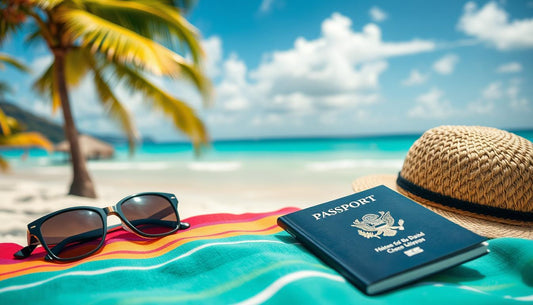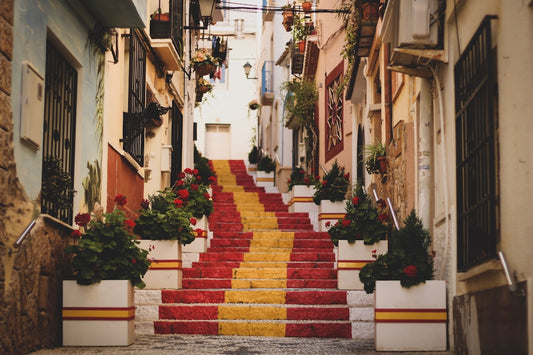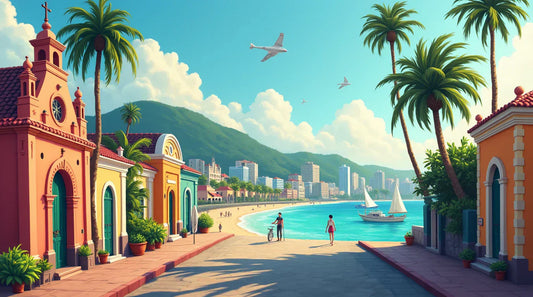France, one of the world's top tourist destinations, is a country rich in history, culture, and fascinating traditions that captivate people from around the globe.
From the great cities like Paris, Bordeaux, and Marseille to the prehistoric sites of the Vézère valley and Brittany's beautiful coastline, there's plenty to explore. You can visit Provence's lavender fields, explore stunning chateaux, and discover why France is considered one of the most beautiful countries in the world.
Learning about France can help both adults and kids develop a deeper appreciation for this European nation. With the French language being one of the most widely studied globally, spoken on five continents, there's much to uncover.
The Hexagonal Country: France's Unique Geography
When viewed on a map, France reveals a fascinating geometrical shape that has earned it a special nickname. The French affectionately refer to their country as "L'Hexagone" ("the hexagon") due to its distinctive six-sided shape. This unique geography is not just a matter of national pride; it also encompasses a diverse range of landscapes and coastlines.
Why France is Called "L'Hexagone"
France earned its nickname "L'Hexagone" due to its distinctive six-sided shape when viewed on a map, making it instantly recognizable among world countries. This hexagonal shape is not just a quirk of geography; it has become an integral part of French identity. The country's mainland is the primary reason for this nickname, although it's worth noting that France's geography extends beyond mainland France to include Corsica and various overseas territories.
France's Impressive Coastline and Landscapes
France boasts an impressive coastline that stretches for 3,427 kilometers, offering diverse beaches and coastal landscapes that attract visitors from around the world. From bustling ports to sandy bays and rocky coves, you'll find beaches of every shape and size along the French coast. The country's geography is remarkably diverse, featuring Alpine mountains, Atlantic and Mediterranean coastlines, lush vineyards, lavender fields, and snow-capped mountains, making it a geographically diverse nation.
As the largest country in the European Union with a land area of 547,000 square kilometers, France occupies a significant place in European geography. When considering all European nations, France ranks as the third-largest country, following only Ukraine and Russia in total land area. This strategic location has historically made France a crossroads of European culture and commerce, connecting northern and southern Europe.
France: The World's Most Popular Tourist Destination
With its stunning landscapes, rich cultural heritage, and world-class attractions, France stands out as a premier tourist destination. You can experience the country's rich history by visiting its iconic landmarks, such as the Eiffel Tower, or by exploring the numerous museums and art galleries.
France's appeal extends to visitors of all ages, making it an ideal place for family trips. The country is home to numerous kid-friendly attractions, including Disneyland Paris, which draws millions of visitors every year.
Record-Breaking Visitor Numbers
France consistently ranks as the world's most popular tourist destination, welcoming approximately 89-100 million visitors annually. To put this into perspective, consider the following statistics:
| Country | Annual Visitors (in millions) |
|---|---|
| France | 89-100 |
| Spain | 82 |
| USA | 78 |
The Tour de France, one of the world's most famous cycling races, has been running since 1903 and attracts global attention to the French countryside and cities.
What Makes France So Appealing to Tourists
France's diverse regions offer something for every type of traveler, from the glamorous French Riviera to the rustic charm of Provence and the alpine adventures in Chamonix. The country's rich linguistic heritage makes it appealing to language enthusiasts, with French being one of the most widely studied languages in the world.
Additionally, France is renowned for its fashion capital, Paris, which is a major draw for international tourists. The city's iconic landmarks, world-class museums, and reputation as a city of love make it a must-visit destination.
The Louvre: Home to Art History's Greatest Treasures

With a rich history spanning centuries, the Louvre Museum is a cultural icon that continues to captivate audiences worldwide. As the world's most visited museum, it represents France's dedication to art and history.
The World's Most Visited Museum
The Louvre Museum in Paris holds the distinction of being the world's most visited museum, welcoming a record 10.2 million visitors in 2019 alone. This accolade is a testament to its enduring appeal and the artistic treasures it houses.
From Royal Palace to Iconic Museum
Originally built as a medieval fortress in the 12th century, the Louvre was transformed into a royal palace before eventually becoming the iconic museum we know today. Its transformation from royal residence to public art institution reflects France's complex history and its commitment to making cultural treasures accessible to all.
The Louvre's collection includes world-famous masterpieces such as Leonardo da Vinci's Mona Lisa, the Venus de Milo, and the Winged Victory of Samothrace, making it a home to some of the world's most renowned artworks.
French Cuisine: A World of Culinary Delights
You might know that French cuisine is famous, but its depth and variety are truly astonishing. French culinary traditions have been recognized by UNESCO as an Intangible Cultural Heritage of Humanity, reflecting the country's rich gastronomic culture.
A Country Renowned for Cheese
France is often referred to as a paradise for cheese lovers. With over 500 varieties of cheese produced in the country, it's no wonder that the French are the highest consumers of cheese globally. From soft cheeses like Brie and Camembert to pungent ones like Roquefort and Époisses, the diversity is staggering.
| Type of Cheese | Region | Description |
|---|---|---|
| Brie | Île-de-France | Soft, creamy cheese with a white rind |
| Roquefort | Occitanie | Pungent, blue cheese with a distinctive flavor |
| Camembert | Normandy | Soft, earthy cheese often served baked |
Wine, Baguettes, and More
Wine is an integral part of French cuisine, with regions like Bordeaux, Burgundy, and Champagne producing some of the world's most celebrated wines. The baguette, a staple in French cuisine, is so revered that there are laws governing its ingredients. French culinary education is also highly regarded, with an emphasis on traditional techniques and fresh, seasonal ingredients.
Children in France are taught to appreciate good food from an early age, with school lunches featuring multiple courses. Traditional French dishes like coq au vin and ratatouille showcase the country's emphasis on regional ingredients and time-honored cooking methods.
Unlimited Data eSIM from RAPIDeSIM
The eSIM France is becoming increasingly popular for travelers thanks to its simplicity and fast activation. Instead of inserting a physical SIM card, you can activate your plan instantly by scanning a QR code. It's compatible with most newer smartphones including iPhone 13 and up, as well as recent Samsung Galaxy models.
You can check if your device supports eSIM via our Compatibility Checker.
Why choose an eSIM from RAPIDeSIM ?
- Instant activation without visiting a store
- No need to remove your current SIM
- Flexible prepaid data plans tailored for tourists
- Strong 4G/5G coverage in major cities and tourist areas
- No roaming charges or unexpected fees
>>Buy an international eSIM<< Get 5% OFF. Code: INTERNETEVERYWHERE25
Surprising Fun Facts About France
As you explore the rich history and culture of France, you'll discover some surprising fun facts that might change your perception of this iconic country. France is not just about art, fashion, and cuisine; it's also a land of fascinating trivia that will captivate kids and adults alike.
The Austrian Origin of Croissants
You might be surprised to learn that the croissant, a staple of French bakeries around the world, actually originated in Austria. The "kipferl," a denser and less flaky pastry, was born in Vienna in the 13th century before making its way to France, where it evolved into the flaky, buttery croissant you know today.
Snails as a National Delicacy
In France, snails, or "escargots," are considered a national delicacy and are traditionally served as an hors-d'oeuvre with garlic butter. The average French citizen consumes approximately 500 snails per year, showcasing the country's love for this unique food item.
These fun facts highlight the interesting aspects of French culture and cuisine, demonstrating how the country has embraced and adapted various traditions to create its own unique identity. Today, France continues to be a significant player in the world of food, producing two new cookbooks every day and innovating culinary traditions.
Unique French Superstitions and Traditions

As you delve into French customs, you'll discover a world of fascinating superstitions and traditions that are still alive today. French culture is rich in practices that may seem unusual to outsiders, but are an integral part of daily life and celebrations.
Never Place a Baguette Upside Down
One of the most enduring French superstitions involves never placing a baguette upside down on the table, as this action is believed to bring bad luck and misfortune. This superstition is thought to have originated in medieval times when executioners would have their bread reserved by bakers who turned the loaf upside down, creating an association between inverted bread and death.
Even today, many French people take this superstition seriously, with bakers and households carefully placing baguette right-side up as a matter of cultural habit.
The Tradition of the Galette des Rois
The Galette des Rois, or King's Cake, is a tradition celebrated on January 6th, marking Epiphany. This flaky pastry is filled with almond cream and contains a hidden charm or "fève." If you find the charm in your slice, you're crowned king or queen for the day, a delight for many French children.
This tradition is a significant part of French culture, bringing families together and highlighting the importance of shared meals in maintaining social bonds.
France's Impressive Cultural Contributions
You might be surprised by the numerous ways France has contributed to global culture. France's influence on the world's cultural and intellectual landscape is profound and far-reaching.
Nobel Prizes for Literature
France has won more Nobel Prizes for Literature than any other country, with 15 laureates since the award's inception. The first Nobel Prize for Literature was awarded to French poet Sully Prudhomme in 1903. Notable French writers include Jean-Paul Sartre, who won in 1967 but declined the prize. French literature has a rich history, shaping Western intellectual thought.
The Birthplace of Cinema
The Lumière brothers, French inventors, created the first movie camera in the late 19th century. They held the world's first public film screening in Paris on December 28, 1895, revolutionizing visual storytelling and entertainment. French cinema has a rich history, with legendary directors like Jean-Luc Godard and François Truffaut.
Iconic French Landmarks and Their Secrets

From the majestic Mont Blanc to the engineering marvel of the Millau Viaduct, France's landmarks are a treasure trove of history and intrigue. You can explore these iconic sites on a tour of France, discovering the secrets behind their construction and significance.
The Eiffel Tower Was Meant to Be Temporary
The Eiffel Tower, now an iconic symbol of Paris, was originally designed as a temporary structure for the 1889 World's Fair. It was scheduled to be dismantled after 20 years but was saved by public outcry and its utility for communication purposes.
Mont Blanc: Europe's Highest Peak
Mont Blanc, standing at 4,807 meters, is the highest peak in Europe and attracts thousands of climbers and tourists each year. You can experience the breathtaking views of this majestic peak by taking the Aiguille du Midi cable car.
Fun Facts About France That Will Surprise You
You might think you know France, but there are many fun facts that will surprise you. France is a country with a rich history, vibrant culture, and fascinating traditions.
The Invention of the Camera Phone
One of the most surprising fun facts about France is that the camera phone was invented there in 1997 by Philippe Kahn, a Parisian entrepreneur. He used it to share photos of his newborn daughter, Sophie, with his family and friends. This innovation revolutionized the way people communicate and share moments from their lives.
The Shortest Reign in History: King Louis XIX
King Louis XIX holds the record for the shortest reign in history, ruling France for just 20 minutes in July 1830 before abdicating the throne to his nephew. This brief reign is a fascinating footnote in French history.
France is also known for its love of certain foods, including snails, which are considered a delicacy. The French consume approximately 30,000 tons of snails per year, with the average citizen eating around 500 snails annually. Snails are typically served with garlic butter, which is a staple ingredient in many French dishes.
| French Delicacy | Annual Consumption | Preparation Method |
|---|---|---|
| Snails (Escargots) | 30,000 tons | Garlic Butter |
| Baguettes | 10 billion | Baked on premises |
| Wine | 11.2 billion glasses | Various grape varieties |
France is famous for its wine production, with wine accounting for nearly 60% of the country's total alcohol consumption. The French drink an estimated 11.2 billion glasses of wine per year, making it one of the world's biggest wine producers. Champagne, Burgundy, and Chablis are just a few examples of the country's renowned wine regions.
Exploring the Wonders of France
Discovering France is like uncovering a treasure trove of historical landmarks, artistic treasures, and culinary delights. The French people have cultivated a unique way of life that balances tradition and innovation, making a trip to France both educational and inspiring for travelers of all ages.
From the sun-soaked beaches of the French Riviera to the snow-capped peaks of the Alps, France's diverse landscapes provide endless opportunities for exploration and adventure. As the largest country in the European Union, France offers incredible regional diversity, with each area maintaining its own distinct culture, cuisine, and traditions.
Whether you're admiring the Eiffel Tower, sampling regional cheese varieties, or exploring medieval villages, a trip to France offers unforgettable experiences. With its rich art history, vibrant language, and delectable bread, including the iconic baguette, France is a destination that will leave you eager to return. Plan your tour with a local expert today and get ready to be enchanted by France's wonders.








